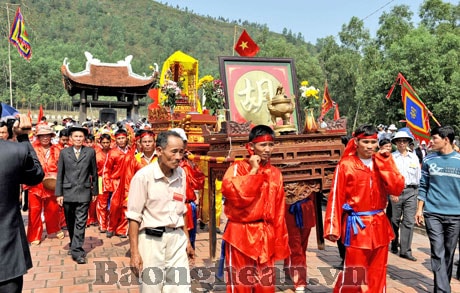Better management of spring festival activities
(Mr. Pham Tien Dung - Deputy Director of the Department of Culture, Sports and Tourism answered an interview with Nghe An Newspaper)
PV: Could you please tell us about the plan of the Department of Culture, Sports and Tourism in decentralizing the organization of festival activities in our province in 2013?
Mr. Pham Tien Dung: In 2013, our province will hold 24 festivals, of which 17 festivals will be concentrated from January to March of the lunar calendar, taking place from the highlands to the lowlands, such as: Pan Pang - Nang Ny Festival, King Mai Temple Festival, Van Loc Temple Festival, Hang Bua Festival, Con Temple Festival, Qua Son Temple Festival, Nguyen Xi Temple Festival, Duc Hoang Temple Festival, Thanh Liet Temple Festival, Bach Ma Temple Festival, Lang Vac Festival, Chin Gian Temple Festival, Cuong Temple Festival, Mon Son Luc Da Festival, Van Temple - Cua Rao Festival, Ru Gam Temple Festival - Yen Thanh, Pu Nha Thau Festival, Cua Temple Festival - Nghi Khanh, Nguyen Canh Hoan Temple Festival... On the occasion of April 30 and May 1, there will be Cua Lo Tourism Festival. In particular, on the occasion of President Ho Chi Minh's birthday on May 19, the people of the whole province organized the Lotus Village Festival. In addition, there was the Drinking Water Remembering Its Source Festival to commemorate the War Invalids and Martyrs Day on July 27 and many other family festivals of ethnic minorities and localities. The Department of Culture, Sports and Tourism requested the Provincial Cultural and Sports Center, the Ethnic Minority Management Board, the General Museum, and the Soviet Museum to be responsible for providing professional guidance; the Departments and Cultural and Sports Centers of districts, cities, and towns to direct the strict implementation of the Law on Cultural Heritage and regulations, decisions, and directives so that the organization of festivals in 2013 takes place seriously, healthily, economically, and preserves the national cultural identity.
Procession at the Ho Family Ancestor Temple in Bau Dot, Ngoc Son Commune (Quynh Luu). Photo: Sy Minh.
PV: What is the specific direction of the Department for festival activities in 2013, sir?
Mr. Pham Tien Dung: Learning from the experience of previous festival seasons, since the end of 2012, the Department of Culture, Sports and Tourism has planned to direct localities to implement well 3 requirements: First, all festivals must develop serious, complete, and focused scripts. Organizing traditional festivals must ensure both the ceremony and the festival. In particular, the festival part must prioritize the restoration of folk games and traditional sports with unique characteristics of each region. Second, the ceremony part must be unified. The sacrificial offering must be written with correct content, close to the theme, concise, and lasting about 15 - 20 minutes. In particular, the items for offerings must be placed according to requirements but still ensure the characteristics of each festival. Third, strictly prohibit all forms of superstition, fortune telling, games with prizes... that affect the cultural and spiritual activities of the festival. Special attention is paid to ensuring security and order, no fireworks, and keeping the environment clean from the beginning until the end of the festival.
PV: One of the problems that greatly affects festival activities is superstition and games with prizes. What do you think about this issue?
Mr. Pham Tien Dung: It can be affirmed that: Many festivals still openly involve activities such as gambling, fortune telling, card shaking..., scenes of visitors jostling and fighting at places of worship, littering on the relic grounds, placing money in the wrong place, soliciting and following visitors... To minimize these shortcomings, first of all, local authorities need to step up propaganda work on mass media so that people can change their awareness, be more conscious of protecting relics and ensuring hygiene. In particular, the management boards of relics where festivals take place need to strictly manage activities with disguised forms, and strictly handle violations. Particularly, the Department of Culture, Sports and Tourism, before the Lunar New Year, assigned the Provincial Center for Culture and Sports, the Management Board of National Heritage and Heritage to conduct training on festival management for officials in charge of cultural heritage, temple and pagoda management boards... At the same time, an interdisciplinary inspection team was established to monitor relics along each route. Localities are required to strictly prohibit the above phenomena. If there are violations, they will be handled by the interdisciplinary inspection team of the department in accordance with the decision of the Provincial People's Committee on implementing civilized lifestyle in weddings, funerals, and festivals.
PV: To reduce the "overload" situation of burning votive paper, what solutions has the Culture, Sports and Tourism sector had, sir?
Mr. Pham Tien Dung: In order to effectively implement Decree 75/2010/ND-CP on regulations on administrative sanctions for violations in cultural activities, recently, the Department of Culture, Sports and Tourism has sent official dispatches to the People's Committees of districts, cities, towns, the Department of Culture, Sports and Tourism, the Center for Culture and Sports, temples and pagodas in the whole province. Organize training on festival management, decrees and ordinances on sanctions for violations in festivals, especially the prohibition of burning votive papers in festivals and at relics. The Department of Culture, Sports and Tourism has established inspection teams and will strictly punish cases of burning votive papers in large quantities. However, to minimize this situation, localities and temple and pagoda management boards need to step up propaganda work so that people are aware that their actions are costly and pollute the environment. Let's learn from the Buddhists at Lien Hoa Pagoda (District 11, Ho Chi Minh City) who have not burned votive papers for more than 10 consecutive years. The abbot of that temple encouraged Buddhists not to use votive paper money when they come to the temple but to save the money for charity.
PV: Thank you very much!
Thanh Thuy






